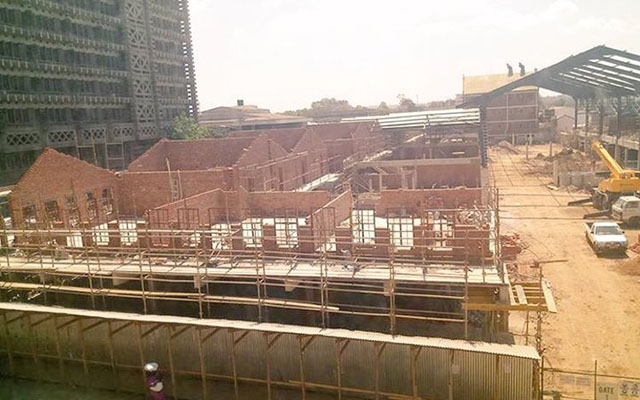Funding challenges stifle industry: Cifoz


The Old Mutual’s Eastgate Metro Centre for Small and Medium Enterprises under construction in Harare
Taurai Mangudhla
Prevailing cash shortages that have given rise to a five-tier pricing system are causing havoc in the construction industry with growth slowing down as projects have become expensive, an industry lobby group has said.
Construction Industry Federation of Zimbabwe (Cifoz) has said the industry’s growth has been subdued over the years due to funding challenges.
“The current liquidity challenges have impacted negatively on operations of most businesses who are failing to interface their operations with the global world,” Cifoz CEO Martin Chingaira has said.
“This has resulted in the economy adopting a five-tier pricing model ((real time gross settlement) RTGS, (point of sale) swipe, EcoCash (mobile money), bond notes and United States dollars) which is not sustainable.
Construction projects are going to be very expensive because prices of building materials are no longer determined in advance by the Built Environment Professionals. Government’s efforts to build low-cost houses is defeated,” Chingaira added.
Mr Chingaira said Government’s foreign debt is also hindering the possibility of businesses accessing funds from foreign banks. Zimbabwe’s external debt and arrears breached the $11,2 billion mark in October last year. This includes arrears to International financial institutions including the World Bank and the African Development Bank. Government has committed to clearing arrears to IFI’s of about $1,8 billion in order to unlock new funding under the Lima Plan.
Cifoz is a non-profit contractors’ association formed in 1915. It has approximately 600 members in a diversity of building, civil engineering and specialist contractor trades. Mr Chingaira’s remarks come as Zimbabwe’s property development firms are faced with a pricing crisis as the prevailing exchange rate challenges complicate their business. Companies that are yet to unveil residential projects to the market are now either considering selling the stands for cash or reducing the payment terms to a maximum of two years as opposed to the prevailing terms of deposits and clearance of balance over five to 10 years.
“Right now we have a new project which is on the market and we are selling low, medium and high density stands on flexible terms of deposits plus balance staggered over five years,” an executive with a to property development firm who requested not to be named said.
“This project has taken time to reach fruition and now the challenge is the exchange rate crisis because swipe and RTGS is no longer equivalent to the US dollar yet we have to import some equipment like graders and spares as well as pipes for water and sewer systems, steel and so on. As a result we are now just taking deposits and allocating the stands to individuals, but we have indicated the final cost is an estimate which will soon be finalised while the balance is now being considered to be repaid over a maximum of two years instead of five,” added the executive.
Rates for buying US dollars with electronic transfers or bond noes have fallen at lest 20 percent afer recent political developments from the high of 85 percent, with bond note premiums almost halving.
This has resulted in a five-tier pricing system particularly in smaller establishments.










Comments